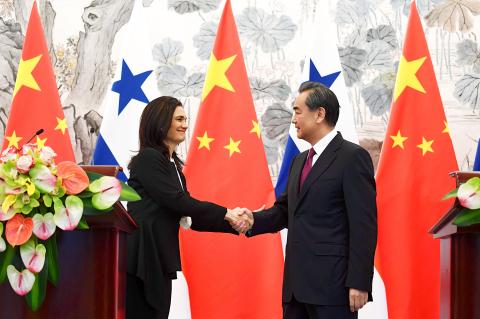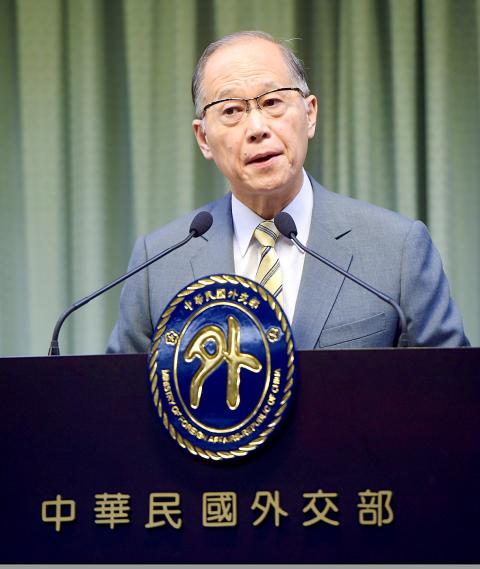Taiwan is cutting diplomatic ties with Panama after the Central American country switched diplomatic recognition from Taipei to Beijing, Minister of Foreign Affairs David Lee (李大維) announced yesterday.
“To safeguard our nation’s sovereignty and dignity, we have decided to terminate diplomatic ties with Panama immediately,” Lee said at a news conference, in which he also expressed Taiwan’s “deep anger and regret” about Panama’s decision.
Taiwan is also to halt all bilateral cooperative projects, cut all assistance to Panama, and pull out its diplomatic staff and technical missions from the country, Lee said.

Photo: AFP
Even though the two nations had maintained diplomatic ties for more than a century, Panamanian President Juan Carlos Varela caved in to Beijing for “economic interests” and ignored Taiwan’s long-term assistance that supported its overall development, Lee said.
Lee described Panama’s diplomatic switch as “most unfriendly” and accused Panama of “deceiving the Republic of China government until the last moment.”
He said that Taipei felt a sense of “strong dissatisfaction and anger” about the move, but reaffirmed that Taipei would not engage in a contest of “checkbook diplomacy” with Beijing.

Photo: Huang Yao-cheng, Taipei Times
Taiwan also “strongly protests and condemns Beijing for luring Panama to switch diplomatic ties, squeezing Taiwan’s space in the international community and hurting Taiwanese feelings,” he said.
Taiwan’s response came after Varela announced that Panama was establishing diplomatic ties with China, saying in a televised address that it represents the “correct path for our country.”
At the Diaoyutai State Guesthouse in Beijing yesterday, Chinese Minister of Foreign Affairs Wang Yi (王毅) and Panamanian Minister of Foreign Affairs Isabel de Saint Malo signed a joint communique establishing diplomatic relations, followed by a champagne toast.
Wang said he was sure relations between the two countries would have a “bright future.”
De Saint Malo said she hoped the new relationship would lead to trade, investment and tourism opportunities, in particular “exporting more goods from Panama to China.”
In the joint communique, Panama said it would not maintain any official ties with Taiwan and also agreed to recognize that there is only “one China” and that Taiwan is part of it.
Panama’s decision leaves Taiwan with 20 diplomatic allies, 11 of which are in Latin America and the Caribbean.
The decision is widely seen as a result of China’s mounting efforts to apply pressure on Taiwan since President Tsai Ing-wen (蔡英文) took office on May 20 last year.
Lee criticized Panama for keeping Taiwan in the dark about the move, but said there had been signs of Panama’s intentions and Taiwan used every means at its disposal to keep the Central American nation from moving in that direction, without going into specific details.
One of the signs was that Panama did not announce a successor after then-Panamanian ambassador to Taiwan Alfredo Martiz Fuentes on April 30 left his post to take over as Panama’s social security chief, even though Martiz told Tsai on April 20 that bilateral relations were solid.
In addition, Ambassador to Panama Miguel Tsao (曹立傑) has not been able to present his credentials since arriving in the country in the middle of last month.
The diplomatic rift came nearly one year after Tsai visited Panama in June last year on her first state visit.
Tsai attended the inaugural ceremony of the expanded Panama Canal and witnessed Taiwan’s donation of 3,000 boxes of flu medicine to help combat an epidemic of the H1N1 flu virus.
Ties between the Republic of China (ROC) and Panama date back more than a century, to when China's Qing Dynasty established diplomatic relations with Panama on Jan. 16, 1910. The ROC continued the relationship after its founding in January 1912.
Panama is the second diplomatic ally to cut ties since Tsai took office, the first being Sao Tome and Principe, which recognized Beijing in December last year.
In March last year, China re-established official ties with the Gambia, more than two years after the small African nation cut off relations with Taiwan.
Panama has actively sought to set up ties with China in the past.
According to a US Department of State diplomatic message released by WikiLeaks, Panama tried to establish relations with Beijing in 2009 without success.
Additional reporting by AP
This story has been amended since it was first published to correct the date of the establishment of diplomatic relations with Panama.

US President Donald Trump yesterday announced sweeping "reciprocal tariffs" on US trading partners, including a 32 percent tax on goods from Taiwan that is set to take effect on Wednesday. At a Rose Garden event, Trump declared a 10 percent baseline tax on imports from all countries, with the White House saying it would take effect on Saturday. Countries with larger trade surpluses with the US would face higher duties beginning on Wednesday, including Taiwan (32 percent), China (34 percent), Japan (24 percent), South Korea (25 percent), Vietnam (46 percent) and Thailand (36 percent). Canada and Mexico, the two largest US trading

AIR SUPPORT: The Ministry of National Defense thanked the US for the delivery, adding that it was an indicator of the White House’s commitment to the Taiwan Relations Act Deputy Minister of National Defense Po Horng-huei (柏鴻輝) and Representative to the US Alexander Yui on Friday attended a delivery ceremony for the first of Taiwan’s long-awaited 66 F-16C/D Block 70 jets at a Lockheed Martin Corp factory in Greenville, South Carolina. “We are so proud to be the global home of the F-16 and to support Taiwan’s air defense capabilities,” US Representative William Timmons wrote on X, alongside a photograph of Taiwanese and US officials at the event. The F-16C/D Block 70 jets Taiwan ordered have the same capabilities as aircraft that had been upgraded to F-16Vs. The batch of Lockheed Martin

GRIDLOCK: The National Fire Agency’s Special Search and Rescue team is on standby to travel to the countries to help out with the rescue effort A powerful earthquake rocked Myanmar and neighboring Thailand yesterday, killing at least three people in Bangkok and burying dozens when a high-rise building under construction collapsed. Footage shared on social media from Myanmar’s second-largest city showed widespread destruction, raising fears that many were trapped under the rubble or killed. The magnitude 7.7 earthquake, with an epicenter near Mandalay in Myanmar, struck at midday and was followed by a strong magnitude 6.4 aftershock. The extent of death, injury and destruction — especially in Myanmar, which is embroiled in a civil war and where information is tightly controlled at the best of times —

China's military today said it began joint army, navy and rocket force exercises around Taiwan to "serve as a stern warning and powerful deterrent against Taiwanese independence," calling President William Lai (賴清德) a "parasite." The exercises come after Lai called Beijing a "foreign hostile force" last month. More than 10 Chinese military ships approached close to Taiwan's 24 nautical mile (44.4km) contiguous zone this morning and Taiwan sent its own warships to respond, two senior Taiwanese officials said. Taiwan has not yet detected any live fire by the Chinese military so far, one of the officials said. The drills took place after US Secretary